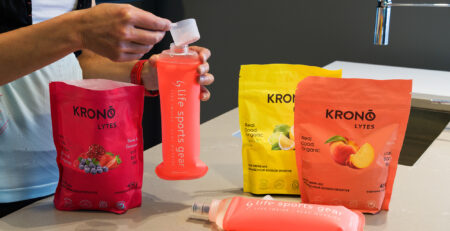
Improving your sporting performance through nutrition
Krono Team2024-01-09T15:40:00-05:00The world of sport is a demanding field where every detail counts. Of course, you’ve heard of the balance between the mental and the physical, but there’s one often overlooked factor that can make all the difference: nutrition. Whether you’re a professional or amateur athlete, what you give your body for fuel can dramatically influence your performance. Let’s delve into the world of sports nutrition to see how it can become your secret ally and propel you to unsuspected heights in your discipline.
Fuel for Excellence
Imagine a world-renowned racing car. It can only reach top speed if it’s fuelled with the very best fuel. In the same way, athletes need quality nutrition to excel. Carbohydrates play a key role. Stored in the muscles in the form of glycogen, they are then converted into glucose to provide the energy needed during exercise. During training, muscles need more of this energy, which increases the demand for carbohydrates. If glycogen stores are depleted, this can lead to a drop in performance and a feeling of fatigue. That’s why it’s essential to consume carbohydrate-rich foods before and during exercise to maintain glycogen stores and ensure an adequate supply of glucose for the muscles.
Recovery and muscle growth
After an intensive training session, recovery is the key to avoiding excessive muscle fatigue and injury. Nutrition plays a fundamental role in this process. Protein is essential for repair, muscle growth and increased endurance. Amino acids, which make up proteins, are essential for repairing muscle tissue damaged during exercise. In addition to protein, it’s crucial to consume anti-inflammatory nutrients such as antioxidants, vitamins and minerals. They help reduce inflammation and prevent cell damage. Foods rich in antioxidants can therefore be particularly beneficial.
Hydration, a pillar of performance
When you train, you sweat and lose electrolytes. These precious nutrients, such as sodium, potassium and magnesium, are essential for maintaining your body’s water and electrolyte balance. Electrolytes play a crucial role in regulating water and body fluids, helping to maintain optimal hydration, prevent dehydration and support muscle function. Electrolyte deficiency can lead to symptoms such as muscle cramps, fatigue, dizziness and headaches. Athletes must therefore be careful to stay hydrated before, during and after exercise.
Personalize your diet
It’s essential to recognize that every athlete is unique, with specific nutritional needs. These needs can vary according to a number of factors, including the type of sport practised, training intensity, individual metabolism and personal goals. For this reason, it is strongly recommended to adapt your nutritional plan to your own needs.
Sports nutrition is a key element in improving performance, promoting optimal recovery and reducing the risk of injury. By providing your body with the right nutrients at the right time, you give it the fuel it needs to excel in your sporting discipline.
